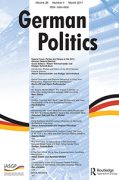Published in German Politics in 2002, this article argues that, although it has often been reduced to the issue of the reunification of the two German states, the so-called German question continued to be a multi-dimensional phenomenon after 1945. This is most obvious in relation to the politics of homeland that is intrinsically linked to German-Czech and German-Polish relations to the present day. After outlining the major developments in relation to the formation, ascent and marginalisation of expellee organisations in the Federal Republic, German government and expellee policies towards Poland and the Czech Republic and the remaining ethnic Germans in both countries are examined as they have evolved over the past 12 years since German reunification. In doing so, the article analyses the new opportunities that have arisen for a process of constructive reconciliation between Germany and its two eastern neighbours since the end of the Cold War, but also points out that the legacy of the past and the different and selective ways in which it has been, and is being, dealt with in all three countries is a factor that has retained its significance for bilateral and international relations in Central and Eastern Europe.

